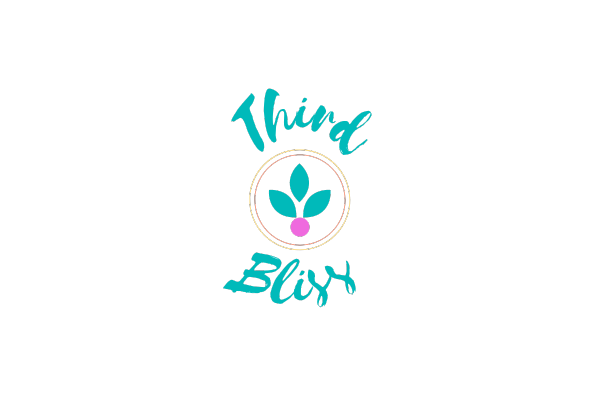How gratitude and thankfulness can improve your life.
Is there a difference between gratitude and thankfulness?
Gratitude and being thankful are two words that are often used interchangeably because their definitions are very similar.
Gratitude is defined as a deep appreciation for a favor, a benefit that was received, or something that is already present in one's life.
Thankfulness is often defined as a feeling of gratitude or an outward expression of something you're grateful for.
Since they sound so similar, why even bother learning the differences between the two?
In this post, I'll go over the difference between grateful vs thankful so you can use them to your advantage and reap their benefits.

Third Bliss is a participant in affiliate programs and this post contains affiliate links. I will earn an affiliate commission, at zero cost to you, if you click through a link and finalize a purchase. Thanks for your support! Read full disclaimer here.
The differences between being grateful vs being thankful.
There are some very subtle differences between gratitude and being thankful.
First, let's take a look at the definition of each one.
The definition of gratitude.
Here is the Merriam-Webster definition of gratitude:
A feeling of appreciation or thanks.
An example of this would be:
"She felt a deep sense of gratitude for all the nurses and healthcare workers."
The definition of thankful.
The definition of being thankful according to Merriam-Webster is:
Conscious of benefit received.
Here's an example:
"The kids were thankful and joyful for the presents they received."
You can see the subtle differences between gratitude and thankfulness inside of the definitions alone.
Gratitude is a feeling and appreciation, while thankfulness is the expression of gratitude.
The practices of gratitude and thankfulness and how they differ.
Another way to tell the difference between gratitude vs thankfulness is to look at how they are practiced.
Gratitude means that you recognize and appreciate what you have. It is an acknowledgment of the good things in your life.
Being thankful, on the other hand, is an action word. You thank someone or something for what they have done for you or given you.
Let me give you an example of how I practice gratitude and thankfulness in my own life so you can distinguish the subtle differences between them.
Let's start with gratitude.
I challenged myself to be grateful for just one thing each day for 30 days by writing in a gratitude journal. I don't remember what exactly inspired this, but I do remember how it made me feel.
At first, it felt like a chore to write down one thing each day I was grateful for. Then after almost a week, I started noticing a shift in the way I felt and how I approached my gratitude exercises.
I was grateful for the little things in my life that I had overlooked and taken for granted before. They were things like:
- Listening to the birds sing outside of my window.
- Eating a piece of chocolate.
- Walking in the garden.
- Staring at leaves and wondering how they changed colors.
- Washing dishes.
You read that last one right, I was even grateful for washing the dishes!
Not only was I grateful for the small things in my life, but they also brought feelings of tremendous joy. I looked forward to writing about them in my journal and it didn't feel like a chore anymore.
Even the thing that I loathed, washing dishes, made me grateful for them. Being grateful was both transformative and transcendent for me because it shifted my perception and made me hyper-aware of the infinite actions that led to that moment.
The most important thing I learned about gratitude was being deeply appreciative of the things that were already in my life and being aware of how deeply we are connected to each other.
Thankfulness, on the other hand, is an outward expression of gratitude that is transactional and spur of the moment. Like when you say thank you to your waitress or when someone pays you a compliment.
This doesn't mean that it's insignificant compared to gratitude. In fact, saying 'thank you' to someone is good practice because expressing thanks outwardly can have a positive & lasting effect on the other person and yourself.
Now that you know about the subtle differences between gratitude and thankfulness, let's talk about their benefits.
The benefits of being grateful and thankful.
Gratitude and being thankful have many benefits from both a mental and emotional perspective.
An article from the Harvard School of Medicine states,
In positive psychology research, gratitude is strongly and consistently associated with greater happiness.
Gratitude can help you:
- Feel more positive emotions.
- Relish good experiences.
- Improve your health.
- Deal with adversity.
- Build strong relationships.
When we are grateful for something, we are saying that that something is worth our time, effort, and attention. To be more grateful is to be aware of all that we have in this life and acknowledge it, both to ourselves and to the world.
When we understand what it means to be grateful and thankful, we begin to enjoy life on a whole new level. We begin to see gratitude as a way to cultivate meaning and purpose in our lives.
Once in a while, you might find yourself struggling with being grateful and thankful. It happens to the best of us, myself included. Remember that it’s a practice so don’t be too hard on yourself.
Instead, acknowledge the negative feelings that come up around practicing gratitude and thankfulness, but try to stay focused on the positive outcomes—how good it will feel once you get started, and how amazing you are for doing so.
With just takes a little practice you’ll likely find yourself opening up to ideas and experiences that are new or you haven't felt in a long time.
If you want to increase your happiness and resilience, express your gratitude and thanks today—to yourself and others.
"Thankfulness is the beginning of gratitude. Gratitude is the completion of thankfulness. Thankfulness may consist merely of words. Gratitude is shown in acts." - Henri Frederic Amiel
How to be grateful and thankful.
The best way to be grateful and thankful is to practice regularly. This requires intention and sometimes a little bit of courage. Over time, you'll be able to reap the benefits of gratitude and thankfulness.
Here are my 5 tips to help you cultivate an attitude of gratitude and thankfulness each day.
1. Start a gratitude journal.
Remember how I mentioned earlier my 30-day gratitude challenge and how it changed my life for the better? You too can start a gratitude journaling to improve your life.
You can start your own gratitude journal at any time and you only need to write down one thing each day that you're grateful for. In addition to this, write how you felt about your experience.
Try to remember the details and be descriptive with your emotions. Here's an example:
I am grateful for watching my dog roll around on the grass with her tongue hanging out. It was amusing, hilarious, and joyful to watch.
Gratitude journaling is a habit, and like all habits, the more you do it, the better you'll get at it, and the more improvement you'll see in your life.
The Five-Minute Journal for Cultivating Gratitude.
2. Say a prayer of gratitude and thankfulness.
Another way to practice being grateful and thankful is to say a simple little prayer to yourself. This is a great way to practice gratitude if writing is not your thing.
I do this regularly in the morning and it only takes a minute. You can do this throughout the day and you can be thankful for anything like, such as your pillow, your bed, or your cup of coffee.
3. Say 'thank you' to someone.
You can express thanks outwardly to another person. You don't have to wait for something big to happen to tell someone 'thank you.'
A simple 'thank you' to your delivery person, your neighbor or anyone you come in contact with throughout your day will suffice.
Not only that, the act of saying thanks will be greatly appreciated by the other person and the positive interaction will uplift you both.
4. Write a thank you note by hand.
Writing a note by hand, let alone a thank you note, is becoming less and less common these days. Thank you smartphones (no pun intended).
In this day and age, when you write a thank you note by hand, it shows that you truly care about expressing your appreciation for the other person.
5. Be mindful.
Mindfulness is a practice that can help you cultivate gratitude and thankfulness because it increases awareness of your thoughts, emotions, and actions.
Awareness helps you appreciate the things and people in your life that you probably take for granted.
Although meditating quietly is the most common type of mindfulness practice, you can be mindful while walking, doing dishes, or driving.
This will take time and patience but the effort will be worth it.
Last thoughts on gratitude vs thankfulness.
Gratitude is a deep appreciation for what you have in your life and thankfulness is the outward expression of gratitude. The differences between being grateful vs thankful are subtle yet can mean the world to how much joy & happiness you encounter in your life.
Cultivating an attitude of gratitude and thankfulness can be as simple as writing it in a journal, saying thank you to someone, counting your blessings in prayer, sending a special note of thanks, and being more mindful.
I hope you found these tips on gratitude and thankfulness eye-opening and helpful! How do you practice being grateful and thankful in your own life? Please let me know in the comments down below!
"Make it a habit to tell people, 'thank you.' To express your appreciation sincerely and without the expectation of anything in return. Truly appreciate those around you, and you'll soon find many others around you. Truly appreciate life, and you'll find that you have more of it." -Ralph Marston

